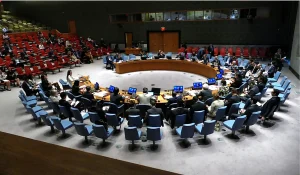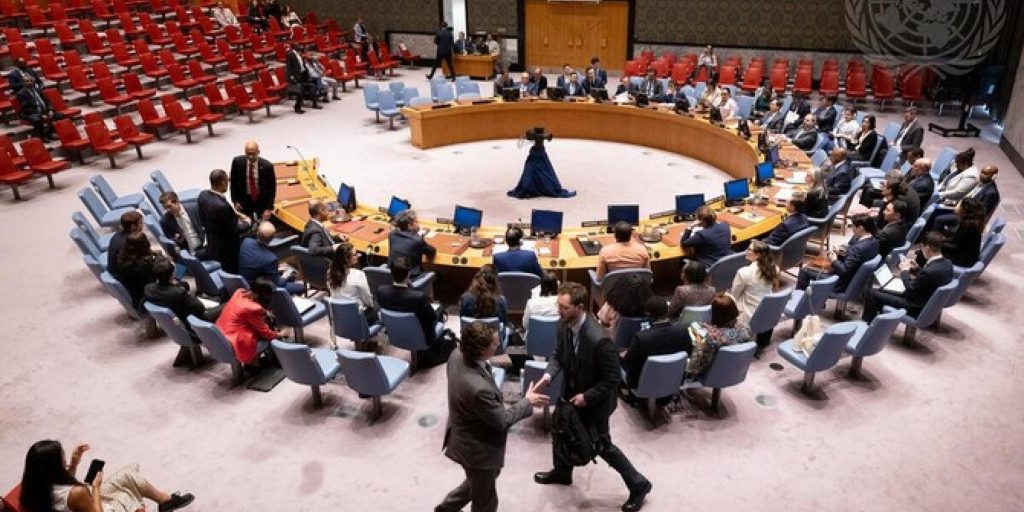UN Security Council Meets Over Israeli Strikes In Rafah That Killed 45 Palestinians.

The UN humanitarian chief, Martin Griffiths, called the attack “utterly unacceptable” and criticised,
Israeli Prime Minister Benjamin Netanyahu’s explanation that what happened in Rafah was a “tragic mistake.” The United Nations Security Council is set to meet Tuesday to discuss the situation in Rafah following an Israeli airstrike that killed 45 Palestinians sheltering in a refugee camp and wounded 200 others. The UN humanitarian chief, Martin Griffiths, called the attack “utterly unacceptable” and criticised Israeli Prime Minister Benjamin Netanyahu’s explanation that what happened in Rafah was a “tragic mistake.” “Whether the attack was a war crime or a ‘tragic mistake,’ for the people of Gaza, there is no debate,” Griffiths said in a statement late Monday according to Voice of America. Griffiths stated that “What happened last night was the latest – and possibly most cruel – abomination. To call it ‘a mistake’ is a message that means nothing for those killed, those grieving, and those trying to save lives.”
Regretting the incident, Griffiths said the United Nations had “warned that a military operation in Rafah would lead to a slaughter” and added that there are no safe areas or humanitarian zones in Gaza but Israel ignored it.
However, in justifying the genocide, Israel said it killed two senior Hamas militants in the attack.
“Despite our best effort, not to harm those not involved, unfortunately a tragic mistake happened last night. We are investigating the case,” Netanyahu told the Israeli parliament.
Netanyahu has repeatedly said Israel needs to carry out an offensive in Rafah in order to achieve its goal of ensuring Hamas cannot operate in Gaza and threaten Israel in the future.
The U.N. high commissioner for human rights, Volker Turk, has also decried the Rafah attack.
In a statement Monday, he described “the images from the camp” as horrific, which he said “point to no apparent change in the methods and means of warfare used by Israel that have already led to so many civilian deaths.”
Even as he noted the Israeli military’s announced investigation, Turk said it was “shockingly clear” that the decision to strike an area “densely packed with civilians” would result in the “entirely predictable outcome” of the death of more Palestinian civilians.
Turk called on Israel to abide by last week’s International Court of Justice order to totally halt its offensive in Rafah. He also urged Palestinian armed groups to stop firing rockets indiscriminately into Israel “in clear violation of international humanitarian law” and release all the remaining 100 or so hostages Hamas is holding in Gaza.
European Council President Charles Michel also called the strikes “horrendous” and urged Israel to stop its offensive in Rafah.
“Horrendous to see innocent Palestinian civilians killed in the recent attack. There is no safe zone for the internally displaced in Rafah,” Michel said on the X social media platform.
The U.N. agency for Palestinian refugees described the situation in Gaza as “hell on earth.”
“Information coming out of Rafah about further attacks on families seeking shelter is horrifying,” the U.N. relief agency said.
The Gaza Health Ministry said the attack ignited fires in tents in an area sheltering displaced people. The Israeli military described its attack as a precise airstrike that killed Yassin Rabia, the Hamas chief of staff for the West Bank.
Qatar’s foreign ministry said Monday the attack could complicate efforts to mediate stalled ceasefire talks and the return of the hostages held in Gaza.
The Israel-Hamas war was triggered by the October 7 Hamas attack on Israel that killed 1200 people, according to Israeli officials, and led to the capture of about 250 hostages.
Israel’s subsequent counteroffensive has killed more than 36,000 Palestinians, a death toll that includes both civilians and combatants, according to the Gaza health ministry.

